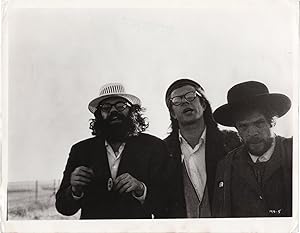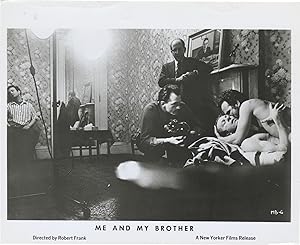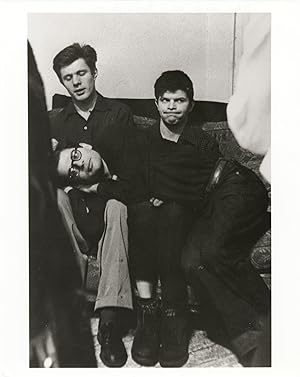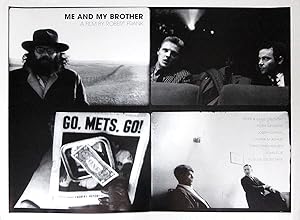Frank Robert Shepard Sam Ginsberg (5 results)
Product Type
- All Product Types
- Books (4)
- Magazines & Periodicals
- Comics
- Sheet Music
- Art, Prints & Posters (1)
- Photographs
- Maps
-
Manuscripts &
Paper Collectibles
Condition
- All Conditions
- New
- Used
Binding
- All Bindings
- Hardcover
- Softcover (1)
Collectible Attributes
- First Edition (1)
- Signed
- Dust Jacket
- Seller-Supplied Images (4)
- Not Printed On Demand
Free Shipping
Seller Location
Seller Rating
-
ROBERT FRANK: ME AND MY BROTHER - Rare Pristine Copy of The First Edition/First Printing
Published by Gottingen, Germany: Gerhard Steidl Druckerei Und Verlag, 2007, 2007
ISBN 10: 3865213634ISBN 13: 9783865213631
Seller: ModernRare, CHICAGO, IL, U.S.A.
Book First Edition
Soft cover. Condition: As New. 1st Edition. 1st Printing. 56 pages. Published in 2007. The author's debut experimental film, presented in its definitive book format. One of the most important titles in Robert Frank's oeuvre. The First Edition. The true first. Precedes and should not be confused with all other subsequent editions, particularly the Reissued Edition. Published in a small and limited first print run as a softcover original only. Published as part of the Steidl "Robert Frank Project". The First Edition is now rare. An austerely elegant production by Robert Frank and Gerhard Steidl: Oversize-volume format. Pictorial softcovers with cream cloth overboards and titles on the cover and spine, as issued. Photographs, stills from his eponymous film, and text by Robert Frank. Printed on pristine-white, thick coated stock paper by Steidl in Gottingen, Germany to the highest standards. Without DJ, as issued. Presents Robert Frank's "Me And My Brother". His first feature-length film, which was premiered at the 1968 Venice Film Festival, in a book format that is specifically designed to be a collectible keepsake. The story of real-life brothers Julius and Peter Orlovsky, who appear as themselves, together with a now-legendary all-star cast led by Allen Ginsberg (Peter's lifelong lover), the great avant-garde theatre director Joseph Chaikin as well as the great character actor Christopher Walken and the young playwright/actor/writer Sam Shepard in their iconic film debuts. "Everything that had defined Frank's art up to that point is packed into this film: The view of America from the outside, the placement of the marginal in a central role, the poetic libertinage of the Beats. The story, which takes place during the showing of another film in a rundown movie theater, weaves together opposites, playing the counterfeit against the authentic, pornography against poetry, acting against being, Beat cynicism against hippie Romanticism, monochrome against color. Celebrates the poetic essay, affirms the underground and the assemblage form, and packs in some bizarre twists and turns" (Publisher's blurb). Robert Frank died on September 9, 2019 at the age of 94 as the greatest photographer of our time. An absolute "must-have" title for Robert Frank collectors. This title is a late-modern art film classic. This is one of few copies of the First Edition/First Printing (issued as a Collector's Softcover Format, NOT just the DVD) still available online and is in especially fine condition: Clean, crisp, and bright. Please note: Should NOT be confused with the Reissued Edition. A rare copy thus. Lavishly illustrated with photographic and film still plates. Three of Robert Frank's books were selected as among the greatest photography books in "The Photobook". At the age of 92, Robert Frank was profiled in 2016 by The New York Times as "the greatest photographer of our time". A fine copy. (SEE ALSO OTHER ROBERT FRANK TITLES IN OUR CATALOG) ISBN 3865213634. no.
-
Me and My Brother (Original photograph from the 1969 film)
Published by Contemporary Films, New York, 1969
Seller: Royal Books, Inc., ABAA, Baltimore, MD, U.S.A.
Vintage reference photograph from the 1969 film, showing Robert Frank, Peter Orlovsky, and Allen Ginsberg. Printed mimeo snipe affixed to the verso, along with the stamp of Israel Film Archive. Director Robert Frank's first feature film and Sam Shepard's screenwriting debut, following Frank as he accompanies poet Peter Orlovsky and Orlovsky's catatonic, mentally ill brother Julius through the late 1960s Beat scene. When Julius wanders off, he is replaced in the film by actor Joseph Chaikin, pushing the boundaries of cinematic reality. The film was restored and released by Steidl in 2007, alongside a book publication outlining the film, which notes: "Frank's feature debut was first screened in 1968 at the Venice Film Festival. Everything which had defined Frank's art up to that point turns up in this film - the look at America 'from the outside,' the poetic libertinage of the Beats, the marginal in a central role. It celebrates the return of the poetic essay as assemblage, the affirmation of the underground as a wild cinematic analysis in the form of a collage, and skillfully weaves together opposites, plays counterfeits against the authentic, pornography against poetry, acting against being, Beat cynicism against hippie romanticism, monochrome against colored. The story contains bizarre twists and turns, and appears to be a rather artless-film-within-a-film being shown at a rundown movie theater." 10 x 8 inches. Near Fine.
-
Me and My Brother (Original photograph from the 1969 film)
Published by New Yorker Films, New York, 1969
Seller: Royal Books, Inc., ABAA, Baltimore, MD, U.S.A.
Vintage studio still photograph taken on the set of the 1969 film, showing director Robert Frank capturing a passionate scene between two men. Stamp of photographer Tom Conroy on the verso. Frank's first feature film and Sam Shepard's screenwriting debut, following Frank as he accompanies poet Peter Orlovsky and Orlovsky's catatonic, mentally ill brother Julius through the late 1960s Beat scene. When Julius wanders off, he is replaced in the film by actor Joseph Chaikin, pushing the boundaries of cinematic reality. The film was restored and released by Steidl in 2007, alongside a book publication outlining the film, which notes: "Frank's feature debut was first screened in 1968 at the Venice Film Festival. Everything which had defined Frank's art up to that point turns up in this film - the look at America 'from the outside,' the poetic libertinage of the Beats, the marginal in a central role. It celebrates the return of the poetic essay as assemblage, the affirmation of the underground as a wild cinematic analysis in the form of a collage, and skillfully weaves together opposites, plays counterfeits against the authentic, pornography against poetry, acting against being, Beat cynicism against hippie romanticism, monochrome against colored. The story contains bizarre twists and turns, and appears to be a rather artless-film-within-a-film being shown at a rundown movie theater." 10 x 8 inches. Near Fine.
-
Me and My Brother (Original photograph from the 1969 film)
Published by Contemporary Films, New York, 1969
Seller: Royal Books, Inc., ABAA, Baltimore, MD, U.S.A.
Vintage reference photograph from the 1969 film, showing Allen Ginsberg with Peter and Julius Orlovsky. Director Robert Frank's first feature film and Sam Shepard's screenwriting debut, following Frank as he accompanies poet Peter Orlovsky and Orlovsky's catatonic, mentally ill brother Julius through the late 1960s Beat scene. When Julius wanders off, he is replaced in the film by actor Joseph Chaikin, pushing the boundaries of cinematic reality. The film was restored and released by Steidl in 2007, alongside a book publication outlining the film, which notes: "Frank's feature debut was first screened in 1968 at the Venice Film Festival. Everything which had defined Frank's art up to that point turns up in this film - the look at America 'from the outside,' the poetic libertinage of the Beats, the marginal in a central role. It celebrates the return of the poetic essay as assemblage, the affirmation of the underground as a wild cinematic analysis in the form of a collage, and skillfully weaves together opposites, plays counterfeits against the authentic, pornography against poetry, acting against being, Beat cynicism against hippie romanticism, monochrome against colored. The story contains bizarre twists and turns, and appears to be a rather artless-film-within-a-film being shown at a rundown movie theater." 8 x 10 inches. Near Fine.
-
Me and My Brother (Original poster for the 1969 film)
Published by Two Faces / New Yorker Films, New York, 1969
Seller: Royal Books, Inc., ABAA, Baltimore, MD, U.S.A.
Art / Print / Poster
Vintage poster for the 1969 film, an experimental mix of documentary and fiction. Poster designed by Robert Frank. Director Robert Frank's first feature film, in which he follows poet Peter Orlvosky and his mentally ill brother Julius as they move through the late 1960s Beat scene, while Peter tries to care for his mostly catatonic brother. When Julius wanders off, he is replaced in the film by actor Joseph Chaikin. The film examines the boundaries of reality and sanity, and features the screenwriting debut of Sam Shepard and the first feature film appearance of Christopher Walken. The film was restored and released by Steidl in 2007, along with a book publication outlining the film. From the Steidl book: "Frank's feature debut was first screened in 1968 at the Venice Film Festival. Everything which had defined Frank's art up to that point turns up in this film - the look at America 'from the outside,' the poetic libertinage of the Beats, the marginal in a central role. It celebrates the return of the poetic essay as assemblage, the affirmation of the underground as a wild cinematic analysis in the form of a collage, and skillfully weaves together opposites, plays counterfeits against the authentic, pornography against poetry, acting against being, Beat cynicism against hippie romanticism, monochrome against colored. The story contains bizarre twists and turns, and appears to be a rather artless-film-within-a-film being shown at a rundown movie theater." 26.75 x 20.75 inches. Near Fine.






